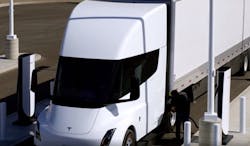Tesla delivers all-Electric Semis to PepsiCo's Frito-Lay plant in California
The future of fleet electrification might actually be all that and a bag of chips, too.
Several years later than first promised but no less impressive upon presentation, Tesla founder and CEO Elon Musk showed off the first Tesla Semi heavy-duty trucks. The company says the Tesla Semi has up to 500 miles in range and can gain a majority charge by 30 minutes or so.
Time will tell on the veracity and testing of these projections, but the first Tesla Semis going to market may offer hope to those who believe fleet electrification will happen in a momentus way. Tesla delivered the first Semis to PepsiCo which plans to use them at the Frito-Lay plant in Modesto, California, according to reports.
"It looks sick," Musk said at the launch event from Tesla’s Gigafactory in Nevada, as quoted by Fleet Owner, a sister publication of EnergyTech. “You want to drive that. I mean, that thing looks like it came from the future."
A TravelCenters of America survey earlier this year noted the worries of fleet owners uncertain about electrification costs and range fears. Most, however, said they expect to have EVs in their fleets by 2030.
PepsiCo, like many other companies trying to decarbonize their freight operations, publicly vows to accelerate its move to electric trucks in the future. Fuel use associated with transportation accounts for 14 percent of PepsiCo’s carbon footprint, the company says.
Implementing zero-emission technologies at the Frito-Lay plant in Modesto has cut that facility’s absolute fleet greenhouse gas emissions by 90 percent since 2020, according to PepsiCo. It expects to deploy 15 Tesla Semis by the end of this year, which is only four weeks away.
The Tesla Semi is described by the EV producer as a Class 8 (heavy-duty) long-haul truck. The first generation of these all-electric trucks is estimated to have a price tag of about $200,000 each.
Electrification of heavy-duty, medium and last-mile freight sectors could play a tremendous role in decarbonizing transportation. At the T&D World Conference and Exhibition this past October in Charlotte, power utility Entergy Corp.'s Chief Customer Officer David Ellis said that commercial and industrial adoption of EVs is moving faster than in the non-C&I transporation sector.
Also highlighted at T&D World, a report by the North American Council for Freight Efficiency found that step vans studied would spend more than $10,000 per van in annual gasoline costs (and that analysis was done when gas was at $2.98 per gallon). By comparison, the electric version of the step van would spend slightly under $2,000 in fuel cost per year.
And if all commercial step vans were converted to electric it might help eliminate 43,476 metric tons of CO2, the report showed.
-- -- --
(Rod Walton, senior editor for EnergyTech, is a 14-year veteran of covering the energy industry both as a newspaper and trade journalist. He can be reached at [email protected]).
Follow us on Twitter @EnergyTechNews_ and @rodwaltonelp and on LinkedIn
About the Author
Rod Walton, EnergyTech Managing Editor
Managing Editor
For EnergyTech editorial inquiries, please contact Managing Editor Rod Walton at [email protected].
Rod Walton has spent 17 years covering the energy industry as a newspaper and trade journalist. He formerly was energy writer and business editor at the Tulsa World. Later, he spent six years covering the electricity power sector for Pennwell and Clarion Events. He joined Endeavor and EnergyTech in November 2021.
Walton earned his Bachelors degree in journalism from the University of Oklahoma. His career stops include the Moore American, Bartlesville Examiner-Enterprise, Wagoner Tribune and Tulsa World.
EnergyTech is focused on the mission critical and large-scale energy users and their sustainability and resiliency goals. These include the commercial and industrial sectors, as well as the military, universities, data centers and microgrids. The C&I sectors together account for close to 30 percent of greenhouse gas emissions in the U.S.
He was named Managing Editor for Microgrid Knowledge and EnergyTech starting July 1, 2023
Many large-scale energy users such as Fortune 500 companies, and mission-critical users such as military bases, universities, healthcare facilities, public safety and data centers, shifting their energy priorities to reach net-zero carbon goals within the coming decades. These include plans for renewable energy power purchase agreements, but also on-site resiliency projects such as microgrids, combined heat and power, rooftop solar, energy storage, digitalization and building efficiency upgrades.

